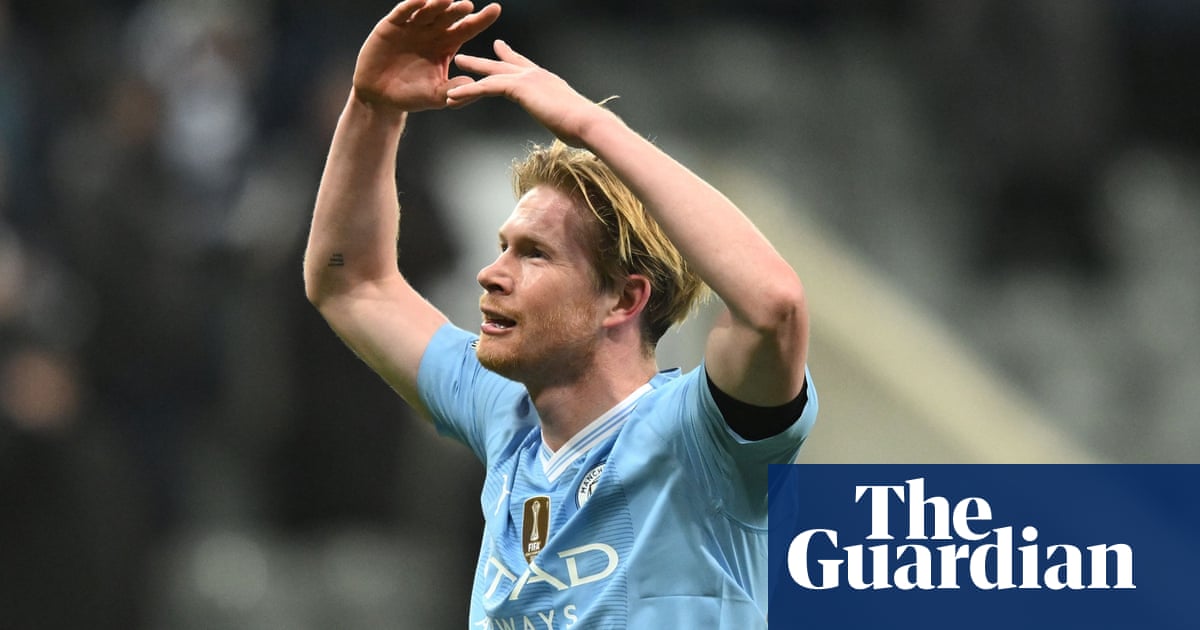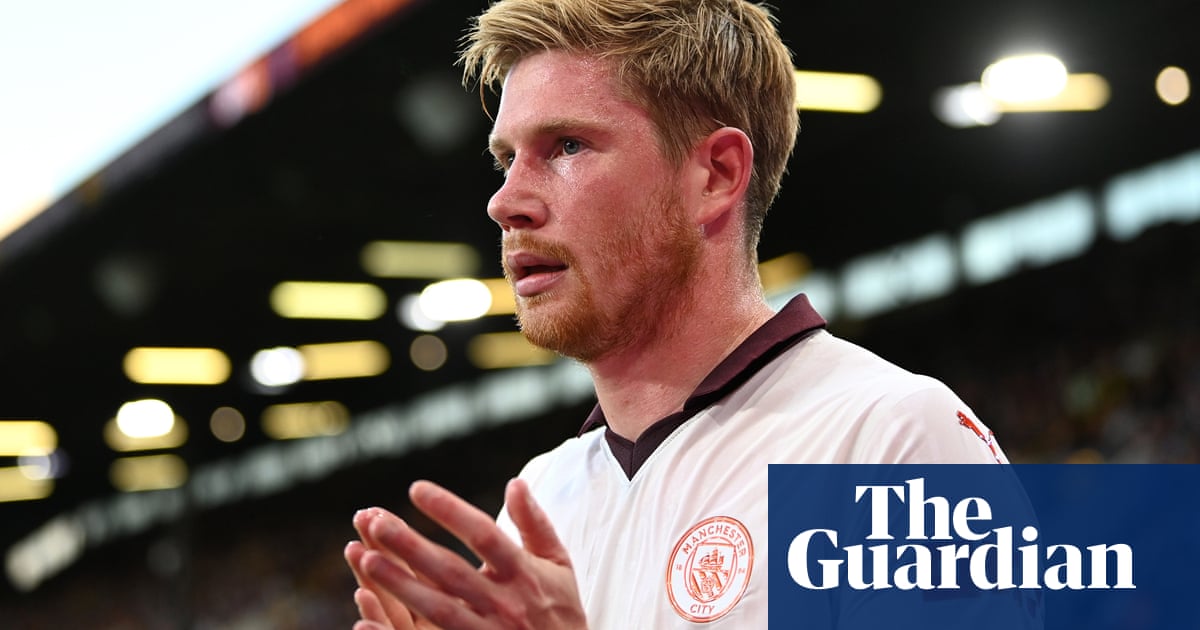
Acouple of weeks ago, Kevin De Bruyne and Oleksandr Zinchenko were filming a video for the Manchester City YouTube channel in which they answered questions put to them by fans. Someone called Hesham from Egypt asked who they thought would be the best player in the world in 2030. “I will be retired,” whispered De Bruyne. “No, you already gone,” retorted Zinchenko. “Finished. You are 30 already. You finished.”
Not a bad gag, as footballer gags go. And yet in this slice of harmless male banter there was a vaguely poignant note, a recognition that even within the City dressing room De Bruyne is increasingly seen as an elder statesman, that he has already reached the point in his career when you start counting the years down instead of up.
It is an impression reinforced by some of his recent performances, in which the current Professional Footballers’ Association player of the year has gradually, but noticeably, begun to display the scarring and attrition of more than a decade at the very highest level of the game.
This is, of course, a matter of degrees. A slightly leaden and creaking De Bruyne is still one of the best players in the Premier League. Even in this apparent trough of form he is still capable of producing moments of sublime grace: the neat through ball for Kyle Walker in the away thrashing of Club Brugge, the scintillating diagonal pass against Liverpool that began the move from which De Bruyne himself scored. But in recent weeks there has been a certain regression too.
Seven games into an injury-hampered season, De Bruyne is yet to record a league assist. His passing statistics and defensive numbers are all sharply down on previous campaigns. Moreover, the eyes tell a similar story. There have been some perplexingly mortal moments: misplaced passes, heavy touches, a loss of sharpness. Above all you get the impression of a player currently striving and failing to impose himself on games, to restore his confidence, to meet the improbably high standards that he himself has set for years.
And so a player who towards the end of last season was being lauded as one of the greatest in the world, and perhaps one day the greatest in City history, is now no longer even sure of his place in the starting lineup for Saturday’s Manchester derby at Old Trafford. Thus far Pep Guardiola has continued to place his faith in his talisman, despite some fans arguing that he should be dropped on current form. But all of this raises intractable questions about just how we should nurture and protect elite players in the modern game, what it is reasonable to expect of them. In short: does De Bruyne simply need to get some more football under his belt? Or is football slowly breaking him?
In retrospect we may well come to see the summer of 2021 as a turning point in De Bruyne’s career. The Champions League final against Chelsea in Porto felt like the ideal stage for De Bruyne to make the final step of his ascent. In the 56th minute of the game he knocked the ball past Antonio Rüdiger, ran after it and was wiped out by the full force of Rüdiger’s shoulder. De Bruyne’s eye socket was fractured; he left the stadium in tears and spent the night in hospital. To this day he remembers nothing from the moment of the challenge itself until 10am the next morning, when he returned to the hotel to collect his belongings.
A few weeks later, playing for Belgium against Portugal in the last 16 of Euro 2020, he was ruthlessly cleaned out from behind by João Palhinha. Still feeling a soreness in an ankle before the quarter-final against Italy, he had two painkilling injections to get through the game, a decision he says he regrets. In the short term, De Bruyne was forced to miss the whole of pre-season, the Community Shield and three of City’s first four league games. The medium-term effects we may be seeing now. The long-term effects, as ever, are unknowable.
What, realistically, did anyone involved think was going to happen to a player whose game is reliant on speed and relentless running and quick thought and very often trying to induce defenders to tackle him? Since the resumption of football following the pandemic-enforced shutdown De Bruyne has played 77 games for club and country while suffering at least four injury layoffs.
His longest break – between Belgium’s exit from the European Championship and the start of the Premier League season – was six weeks. And so De Bruyne’s slump is really less a story of one genius footballer than a cautionary tale for the game at large. If you’re going to force players to perform at a shatteringly high intensity twice a week, for years on end, often through the pain barrier, and with a bare minimum of rest in between games, then don’t be surprised if one day they snap.
De Bruyne is, remember, still only 30. He’s four months younger than Riyad Mahrez. This year he signed a four-year contract at City worth an estimated £385,000 a week. And yet it is reasonable to ask how long he can continue to express the full range of his talent without significant rest and rotation or further injuries. His travails in a City shirt this season are an indication that, for all his relative youth and work ethic, it may not be quite as long as we would like.
“We forget they are human beings,” Guardiola said this week with regard to De Bruyne’s workload, and if there is anything to quibble with in that statement it is that in large part football has never really seen its performers as human beings in the first place.
Either way it feels like these hurtling 18 months – between that fateful Champions League final and the next World Cup in Qatar – will be the pivotal stage of De Bruyne’s career, and one that administrators, coaches and De Bruyne himself will need to navigate with the utmost care.












